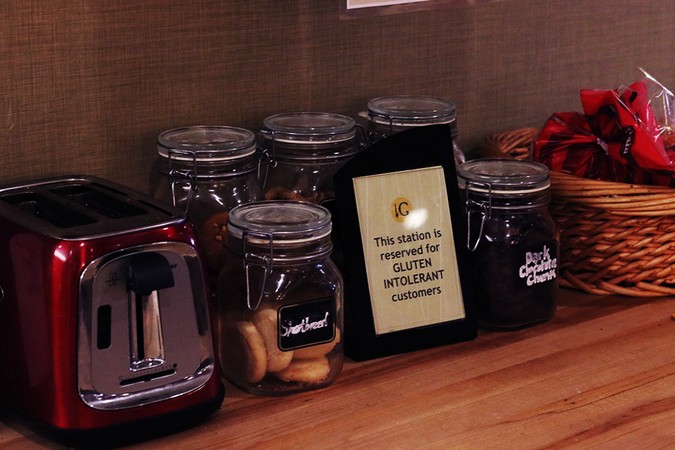When it comes to specific dietary needs, trying to eat in the Caf presents a daunting task to undertake. However, the dining services at Biola seek to help students with any dietary restrictions, such as food allergies, by finding what they need and accommodating to these needs.
THE PROCESS
The first step for students with dietary restrictions consists of registering any restrictions with the Learning Center, explained catering supervisor Shelby Manchester. Once completed, the Caf then approves these requests as well.
“They go to the Learning Center and they provide documentation of whatever dietary needs they have, because they have to have a doctor’s note to even get approved to begin with,” Manchester said. “We go over their allergies… and then we approve them also.”
Manchester also noted that since the Caf provides a variety of options for students with all kinds of diets, getting into the program may prove unnecessary for those with less restrictive dietary needs.
“For example, if they’re just lactose intolerant, they’re gonna get approved by the Learning Center, but they might not get approved by us because, generally speaking, there’s enough options on any given day… for them to choose from. It’s not really necessary for them to get on this whole program,” Manchester said.
While some situations prove unnecessary, students with dietary concerns can receive a tour around the Caf to discover the options and find what works best for them.
“Sometimes they don’t know the options, or they don’t know what the program is, and so then, it really would be more beneficial for them to just stay eating as normal, more or less,” Manchester said.
THE DINING EXPERIENCE
Junior nursing major Abigail Andersen has an intolerance to gluten and eats a gluten-free diet. Andersen shared that the Caf provides enough gluten-free options for her to eat balanced meals without a customized menu.
“They have the stations where they put the gluten-free stuff,” Andersen said. “Sometimes they’ll have bagels, sometimes they’ll have muffins—different types of cookies, cereals, breads, rolls occasionally, crackers, oatmeal. So, they do a pretty good job of doing that.”
If cross-contamination poses a risk, students admitted into the program may request meals prepared separately. To receive these meals, students must fill out and submit a form weekly.
“They choose which [meals] they want for each day. We have these forms that they fill out, and it’s shared in the Google Drive,” Manchester said. “And so every week by Thursday, they submit their meal. They put in the time they want their meal, the day, what meal it’s for and then the option for what they want.”
Severe allergies constitute thorough precautions in preparation, which the Caf takes into great consideration. In this case, students may customize meals that suit their needs.
“There are some students that have more severe allergies, and when it comes to students with those, we are totally open to customizing the menu,” Manchester said. “If there’s a student that has exceptions, it’s not like, ‘You have to have this food, or you’re not eating.’ Because we’re here to feed you. If that’s the case, we just work with them and the chef and create a menu that they can choose food from.”
Bon Appétit general manager Steve Rall oversees many of these specific needs, including students with dietary restrictions who request special products. If the Caf does not provide a specific product, such as condiments, for these students, they have the ability to order them and store them in the Caf.
“Say it’s a BBQ sauce, and you’re allergic to molasses, but this BBQ sauce doesn’t have molasses in it and it fits what you need,” Rall said. “Instead of making just a small amount of BBQ sauce, I’ll let them buy a condiment and reimburse them also, if it makes sense. But whatever it is, it would get stored here.”
Andersen believes the Caf has done its best not only to assist those with dietary needs, but also to provide a wide variety of options that make up a well-rounded diet.
“I think the Caf’s done a pretty good job at trying to listen to us and take into consideration special treats and things like that for us, which I really appreciated,” Anderson said.
Special diets do not fall in the category of normal occurrences, and students with these restrictive diets have to consider all their options to maintain their health. Rall recognizes the restrictiveness of certain diets, and observes the challenging aspects.
“We try to work with people as best we can and provide them with some choices of ingredients.
It’s challenging for students. When they go on the special diet program, it’s usually because they have to,” Rall said.







